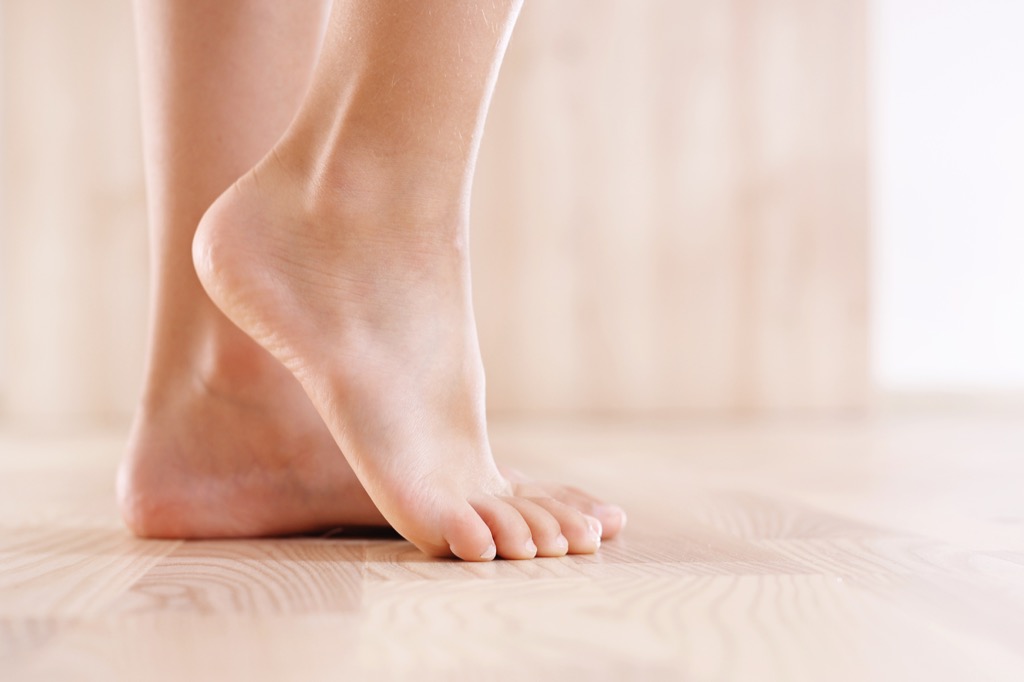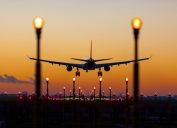What Lots of Air Travel Does to Your Body
The side effects of flying go a lot further than popped ears.

With increasing travel requirements for countless occupations and flights getting cheaper, more Americans are traveling on a frequent basis than ever before. In fact, in a single year, the FAA handles an average of 42,700 flights a day, or 15,631,000 per year. And while the marvels of modern aviation certainly don't go unappreciated, racking up those frequent flier miles doesn't come without its perils.
"While jet-setting can be exciting, it's important to note that frequent air travel can take a psychological, physiological, and emotional toll on you," says Dr. David Greuner of NYC Surgical Associates.
If you're a frequent flyer who's unsure of how, exactly, all that time at 30,000 feet affects your body, wonder no longer. We've rounded up the most surprising side effects of flying. All in all, it's sure to give you some extra incentive to log some downtime between flights. Now, where's that airport bar…
1
You're likely to get sick—a lot.

While your immune system may be strong enough to fight off the occasional cold or flu passing around your workplace, if you're taking regular flights, you're likely to get sick with relative frequency. "You are much more likely to catch a cold from flying because part of the air is re-circulated and there are lots of germs on airplanes from arm rests, tray tables, overhead bins and from those who are coughing and sneezing around you—especially those that don't cover their mouths," says Dr. Janette Nesheiwat, MD. Her solution? "Keep hands washed and clean. Don't rub your eyes or nose."
2
Your memory may lag.

If you're feeling a little spacey after logging some frequent flier miles, you're not imagining things. In fact, a study published in Experimental Brain Research revealed a link between spending extended periods of time at high altitudes and reduced verbal working memory, so if you know you'll be taking regular plane trips, try boosting your brainpower with some crosswords or puzzles to combat the effects of your travel.
3
You'll experience more frequent confusion.

While a plane's cabin may be a pressurized area, don't assume that means you won't feel the effects of your high-altitude journey. According to the WHO, the air pressure within a plane is equivalent to the air pressure at between 6,000 and 8,000 feet outside. Unfortunately, this means less oxygen is making its way into your bloodstream, potentially leading to some severe brain fog. In fact, according to research published in the International Journal of Aviation Psychology, confusion is a frequent side effect for those who experience frequent low blood oxygen levels.
4
You're more likely to get recurring headaches.

Those pounding headaches that won't go away likely have a single culprit: your travel schedule. According to research conducted at the University of Copenhagen, low blood oxygen, which can be triggered by spending time at a high altitude, can be a trigger for both migraine and cluster headaches.
5
You're more likely to be sleepy.

If you're reaching for the nearest pillow the second you board your flight, you're not alone. "The change in oxygen levels can make you feel fatigued," says Dr. Nesheiwat.
6
But you're more likely to have trouble going to sleep.

The bad news? Just because you're feeling more fatigued doesn't actually mean you'll be any more likely to get some sleep when you arrive at your destination. "If you are traveling from one country to another, you can experience jet lag, which throws off your circadian rhythm off, exacerbating and prolonging these symptoms of fatigue," says Dr. Nesheiwat.
7
You increase the signs of aging.

That dry airplane air is doing no favors for your skin, says Dr. Nesheiwat. In fact, the lack of moisture tends to make skin appear older, as well as potentially speeding up the appearance of wrinkles. The good news? There's a simple solution. "Ask for a water instead of a martini," recommends Dr. Nesheiwat. In addition, a vitamin C supplement can help combat the aging effects of dry skin, according to research conducted by the American Society for Nutrition.
8
You increase your risk of deep vein thrombosis.

Those long hours spent sitting, combined with low blood oxygen levels and high altitude, can be a deadly combination. In fact, the combination can trigger deep vein thrombosis, a condition that causes potentially life-threatening blood clots. "High altitudes can affect blood pressure causing swelling in the legs, ankles and being sedentary on a plane for long periods of time can put you at high risk of DVT, which can be life threatening as they can dislodge and travel to the lung and cause death," says Dr. Nesheiwat. "Even if you don't have high blood pressure, if you are on birth control pills or if you are a smoker, you are at a higher risk of developing a blood clot."
9
You develop worse breath.

If you're hoping to carry on a conversation with your seat mate, you might want to consider popping a mint first. According to the WHO, the humidity level in an airplane is generally lower than 20 percent—less than that of the Sahara—which can often contribute to serious dry mouth. Unfortunately, without adequate saliva present to knock out some of those bad bacteria cropping up, you're more likely to have some serious halitosis by the end of a few long-haul flights.
10
You're more likely to experience tooth pain.

Don't blame those suddenly-painful teeth on your dentist—blame them on your cruising altitude. According to a study published in the Journal of Endodontics, a number of patients studied experienced significant tooth pain at high altitude. Since high altitude exposure has a tendency to cause gases in the body to expand, those with preexisting dental conditions can occasionally experience gas pockets surrounding their teeth and oral tissues, causing pain.
11
Your brain changes.

In fact, researchers at University College London's Centre for Altitude, Space and Extreme Environment Medicine found that high-altitude ascents, like those you might make during a flight, can actually change the structure of your brain. Fortunately, most effects are reasonably minor.
12
Your blood becomes less oxygenated.

While the air we typically breathe generally contains about 21 percent oxygen, that number dips to just 15 percent aboard a plane, according to the European Lung Foundation. Unfortunately, this necessarily reduces the amount of oxygen in the blood, and can contribute to a wealth of health issues, from confusion to headaches to fatigue. And while most healthy people can recover from periods of low blood oxygen, for those with lung health issues and other conditions that affect their blood oxygenation, frequent air travel could present some serious concerns.
13
You increase your radiation exposure.

While not exactly akin to getting a daily x-ray, Dr. Greuner cautions that frequent flying can increase your radiation exposure—and in some cases, quite significantly. In fact, a study published in Aviation, Space, and Environmental Medicine reveals that the flight attendants studied experienced levels of radiation higher than recommended for humans, potentially causing reproductive consequences among those on the flight crew.
14
You'll be more stressed out.

Those high-altitude flights and your high stress levels are more interconnected than you might have imagined. "Let's face it: traveling can be anxiety-inducing; if you fly often, the stress can build up and have negative consequences," says Dr. Greuner. According to a study published in PLoS Medicine, individuals with low blood oxygen due to COPD frequently experience anxiety, suggesting a potential link between those frequent flights and your worsening mood.
15
Your body is likely to swell.

Those swollen feet and hands you're experiencing aren't just the result of having a few too many salty snacks on the flight. The combination of low cabin pressure, prolonged periods of inactivity, and the dry air aboard planes can cause swelling, particularly in the extremities. And, while most people go back to normal post-flight, ask anyone who's suffered from swollen feet during pregnancy and they'll tell you that sometimes those changes don't go away quickly—if they do at all.
16
Your food preferences change.

If you've been logging long miles on a 747 and finding that your food preferences have started to change, the two aren't necessarily unrelated. The combination of pressure changes and dehydration can actually reduce your taste buds' sensitivity to both sweet and salty flavors, increasing your desire for a chocolate-cake-and-tomato-juice combo that might otherwise seem repulsive on the ground.
17
You become more anxious.

Travel stress isn't the only change to your mental state you might experience after a few too many work trips. The high altitude on flights can increase your predisposition to anxiety—in fact, a study published in the Journal of Environmental Psychology found that decreased blood saturation was linked to increased symptoms of anxiety among test subjects.
18
Your performance on tasks decreases.

If you're struggling to get your work done on a plane, it's probably more than the in-flight entertainment options keeping you distracted. According to research published in High Altitude Medicine & Biology, task-based performance decreases after altitude exposure, meaning those frequent flights could actually be making you worse at your job over time.
19
You bloat more easily.

That distended belly could be the result of that cheeseburger you ate at the airport, but more likely, it's the result of those frequent trips you're logging. "It's possible to have an upset stomach, bloating, and cramping due to the gas in our belly and pressure changes with the altitude changes," says Dr. Nesheiwat.
20
Your hearing becomes less effective.

While many people experience some degree of hearing loss as they age, if those symptoms have come on suddenly, your air travel habits could be to blame. In fact, research published in The Internet Journal of Otorhinolaryngology revealed that everything from sudden hearing loss to tinnitus is associated with spending time at high altitudes.
21
Your heart attack risk increases.

Eager to improve your cardiovascular health? It might be worthwhile to see if you can cut back on your airplane travel. "Jet lag can lead to fatigue and a variety of health issues," says Dr. Greuner. Among these? "An increased risk of stroke or heart attack."
22
You get more frequently dehydrated.

That low-humidity air in a plane isn't just drying out your skin: it's making your whole body dehydrated. While the standard effects of dehydration, like thirst, dry skin, and headaches, are bad enough on their own, regular dehydration can have more serious effects. Frighteningly enough, research published in Military Medicine reveals that not only were 30 percent of the pilots studied were dehydrated, their dehydration had serious cognitive effects, reducing their overall performance on flight simulation tasks.
23
Your reaction time increases.

Feeling a little slow on the uptake after a flight? It's not just your imagination—high-altitude trips can significantly delay your reaction time. However, it doesn't take much time in the air for this effect to become pronounced: researchers at the S. Gerardo Institute for Biomedical Sciences found that a single high-altitude climb induced delayed reaction time.
24
Your body aches more often.

Between the cramped seats, the difference in pressure, and the low humidity, those who fly frequently are more predisposed to aches and pains than their counterparts on the ground. Case in point: one study of flight attendants revealed that 24 percent reported experiencing back pain in the previous week, 24.2 percent had foot pain, and 21.3 percent experienced foot pain.
25
You experience reduced motor function.

That clumsiness post-flight isn't just the result of that mini-bottle of wine you had at 30,000 feet. In fact, research published in the European Journal of Neurology reveals that reduced oxygen as a result of high altitude can cause changes in both the brain's gray and white matter, specifically in the areas related to motor function.
To discover more amazing secrets about living your best life, click here to sign up for our FREE daily newsletter!





















